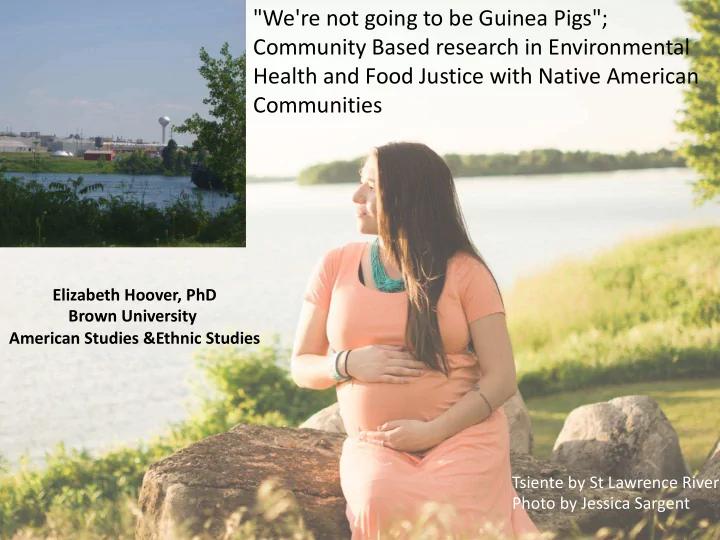

"We're not going to be Guinea Pigs"; Community Based research in Environmental Health and Food Justice with Native American Communities Elizabeth Hoover, PhD Brown University American Studies &Ethnic Studies Tsiente by St Lawrence River Photo by Jessica Sargent
= New York State = Quebec (Districts of TsiSnaihne or “Snye” and Kanatakon or “St Regis”) = Ontario (District of Kawehnoke or “Cornwall Island”)
Reynolds Metals General Motors Foundry (view from Gina’s front yard, Cornwall Island)
209 congeners Manufactured in mixtures– Aroclor 1248 (48% chlorine) Possible health effects: cancer, endocrine disruption, immune suppression, neurobehavioral abnormalities Bioaccumulate, biomagnifigy Animate ( Chen Animacies) PCBs “migrate,” volatilize You probably have some too… ..
Katsi Cook Woman’s Dance Project Mother’s Milk Project First Environment Research Project (FERP) Iewirokas
Community Based Participatory Research (CBPR) • SUNY Albany • First Environment Research Project (FERP) • Akwesasne Task Force on the Environment (ATFE)
Skennen ( peace) à Kariwiio/kanikonri:io (good word/mind) à Kasastensera (strength) Peace à respect Good mind à equity Strength à empowerment
Diabetes Heart Disease Decreased thyroid function Lower testosterone Menarche affected Cognitive , memory Ovulation Data collected 1985-2003 (papers published through 2012), and 2009-2013 (publications ongoing)
Health study process: Homes chosen random sampling Series of visits by FERP employee, collect data Data analyzed in Albany Participants sent results letters
Snowball sampling Targeted interviews Visits– traded labor, met over food and coffee Asked about participation in health studies, changes in community food systems, threats to community health I interviewed 63 Akwesasronon-- 32 involved in studies, 6 FERP employees, 7 SUNY scientists,
¾ of the interviewees replied they had dramatically decreased or entirely ceased local fish consumption After advisories Because of changes in fish. Cultural obligation to keep eating fish Cultural impacts of ceasing fish consumption Language loss Loss of opportunities to connect with
Environmental Reproductive Justice • Ensuring that a community's reproductive capabilities are not inhibited by environmental contamination • Considering the impact of envi contamination on the reproduction of knowledge and culturally informed tribal citizens
Environmental Reproductive Health Symposium 2011 Hot Springs SD
Chart found at: http://aaspire.org/about/cbpr.html
Community members: some happy w receipt of their info, some didn’t understand what it meant (expectations of science). FERP employees found the job tricky but rewarding Scientists: learned a lot from having to negotiate with community, better results Negotiating time and ownership of data tricky
Opportunity for more personalized report back, educate whole family Target “social body” rather than individual body O’Neil (2004:36) “We must insist, then, that the family should be a thinking body , whose common sense should be fostered in any health community and by any practical means .”
¼ of community is diabetic Social aspects of eating; “One dish, one spoon: Whole family needs to work on diet together
Oherokon: “Under the Husk” Rites of Passage
Risk • Risk reduction strategies look to risk-producers to prevent or eliminate environmental contamination in order to avoid human exposure. • Risk avoidance strategies call upon the risk- bearers to alter their practices so as to avoid the harms of exposure to contamination. • “civic dislocation” (Jasanoff 1997)
ARARS Applicable or Relevant and Appropriate Requirements For PCB cleanup at Akwesasne, 10x more stringent than the state and federal standards Craig Arquette, Environmental Specialist for SRMT Envi Division
EPA 5 Year Report “remedial actions have been completed in the St. Lawrence River, Raquette River, and Turtle Cove, and, when combined with the existing fish advisories , these measures address unacceptable exposure pathways in these areas”
Craig Arquette Environmental Specialist for SRMT Envi Division
New Fish Advisory
Ase Tsi Tewaton Natural Resources Damages Assessment
Implications/Applications • We need policy regulations/ direct action that will better protect the health, culture, and food sources of Indigenous communities from environmental contamination (risk reduction vs risk avoidance) • Importance of community-based participatory research • Important to consider settler colonial context and unique position of Tribal nations in deciding what constitutes EJ and RJ (includes ability to pass on cultural knowledge) • Importance of highlighting survivance
http://gardenwarriorsgoodseeds.com/
www.gardenwarriorsgoodseeds.com
Recommend
More recommend